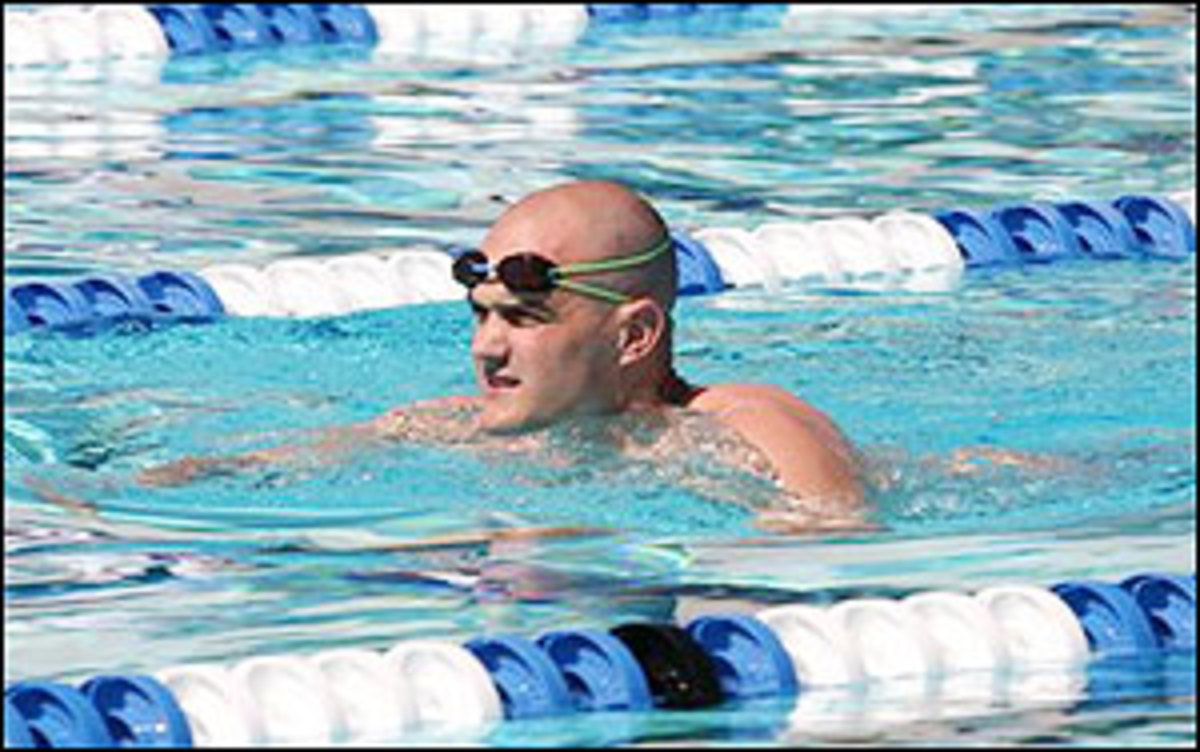Pool of dreams
Dave Denniston began filming himself.
It's the first coherent thing that came to the 16-time All-America swimmer's mind as he lay there in the snow, numb and afraid. After crashing into a tree while sledding down snowy ranges in his native Wyoming with lifelong friend, Andy Miller, on Feb. 6, 2005, he reached for the small digital recorder. As he taped, he said goodbye to family and friends, telling them he loved them. He then let out a few primal screams.
Thinking death was upon him, Denniston prayed. "I don't understand what's happening here, but please don't let me die," he said to himself, "and if I somehow get through this I'll make the most out of my situation."
Prior to the trip, as a world-class swimmer who failed to make the U.S. Olympic team in 2004, Denniston was wondering what his next career step was. He made a number of contacts in swimming and one of them was Jan Cameron, who extended an invitation to Denniston to coach in New Zealand. Denniston decided to go back to Wyoming before making the leap.
What happened on the trip changed his journey forever. Denniston planned the rustic get-away with Miller. No running water. No electricity. Miller and Denniston used gas bottles for lanterns on the way to the cabin, a seven-mile trek in snowshoes. An old friend awaited them: A plastic sled Denniston used as a kid in the summer time.
After a night of digging and camping, Denniston and Miller debated what to do Sunday morning, ice fishing or sledding. They opted to sled.
"It got to be too easy sitting down in the plastic sled," Denniston says. "So I went down head first. The first time it went great so I started feeling pretty confident and got a little cocky."
The second run was different.
"The sled went one way and I went heading into a tree," Denniston said. "I spun my body around instead of going head first into the tree, I went into a tree with my back absorbing the blow. I was awake the whole time. I just remember the wind being knocked out of me instantly and not feeling my legs. All I could do was yell 'Help!' Andy came down, and I was coughing up blood."
Miller found a couple of snowmobilers nearby. Attempts to move Denniston by a toboggan didn't work, but Miller remembered the Global Positioning System (GPS) he had and phoned in specific coordinates to authorities. In the meantime, Denniston wondered if he'd be alive by the time help arrived.
"I was terrified," Denniston says. "I didn't know whether I was bleeding internally or not."
Laramie paramedics reached Denniston in time. When surgeons and experts at Laramie Hospital saw Denniston's back, they told him that they had never seen anyone break his back quite like he did. Denniston had stretched and bruised his spinal cord and shattered two vertebrae.
While Denniston was in the hospital, he received more than 2,000 e-mails from it seemed every coach and swimmer he came across or worked out with.
"It's then, I think, lying in that hospital bed that I had to make a conscious effort to change," Denniston said. "I have, however, embraced being in a wheelchair. I started to laugh about it. I'd tell people that I had a really bad date with a tree."
Part of that vow seems to have involved getting back into the pool and competing again. It was always Denniston's childhood dream to swim in the Olympics, and that could be realized this summer in the Paralympics in Beijing.
Denniston, 29, has a unique way of looking at his situation. "It's the best thing that's ever happened to me," said Denniston, who travels the country doing motivational speaking. "My body may be paralyzed, but my mind and my heart isn't."
Last August, Denniston received a message from a friend, Jimi Flowers, who recruited Denniston to Auburn and was his individual coach his sophomore year. Flowers was working with the U.S. Paralympic swim team and thought he'd reach out to Denniston about the possibility of swimming again.
"I noticed Paralympic swimmers were doing phenomenal things," Denniston says. "I was wondering why these swimmers weren't getting more recognition. That was my drive, getting these other athletes more recognition than anything for myself."
Denniston found his specialties, the breaststroke and butterfly, were more demanding swims than when he was an able-bodied swimmer. "It takes me exactly twice as many strokes as it did before; twice as much effort to go as far," Denniston said. "The ultimate goal is to make the U.S. team that goes to Beijing."
Nothing has deterred him.
In August 2005, Denniston became more aware of simple things, like every-day people running across busy streets just to open a door for him. He's gone whitewater rafting through the Grand Canyon; he's gone back to doing many of the outdoors things he'd do with his father before the accident.
"I'm swimming again and who knows," says Denniston, who will swim in the April 3 trials. "Maybe I will get that gold medal I always dreamed about. I do know this: I'm having the best time of my life right now."






